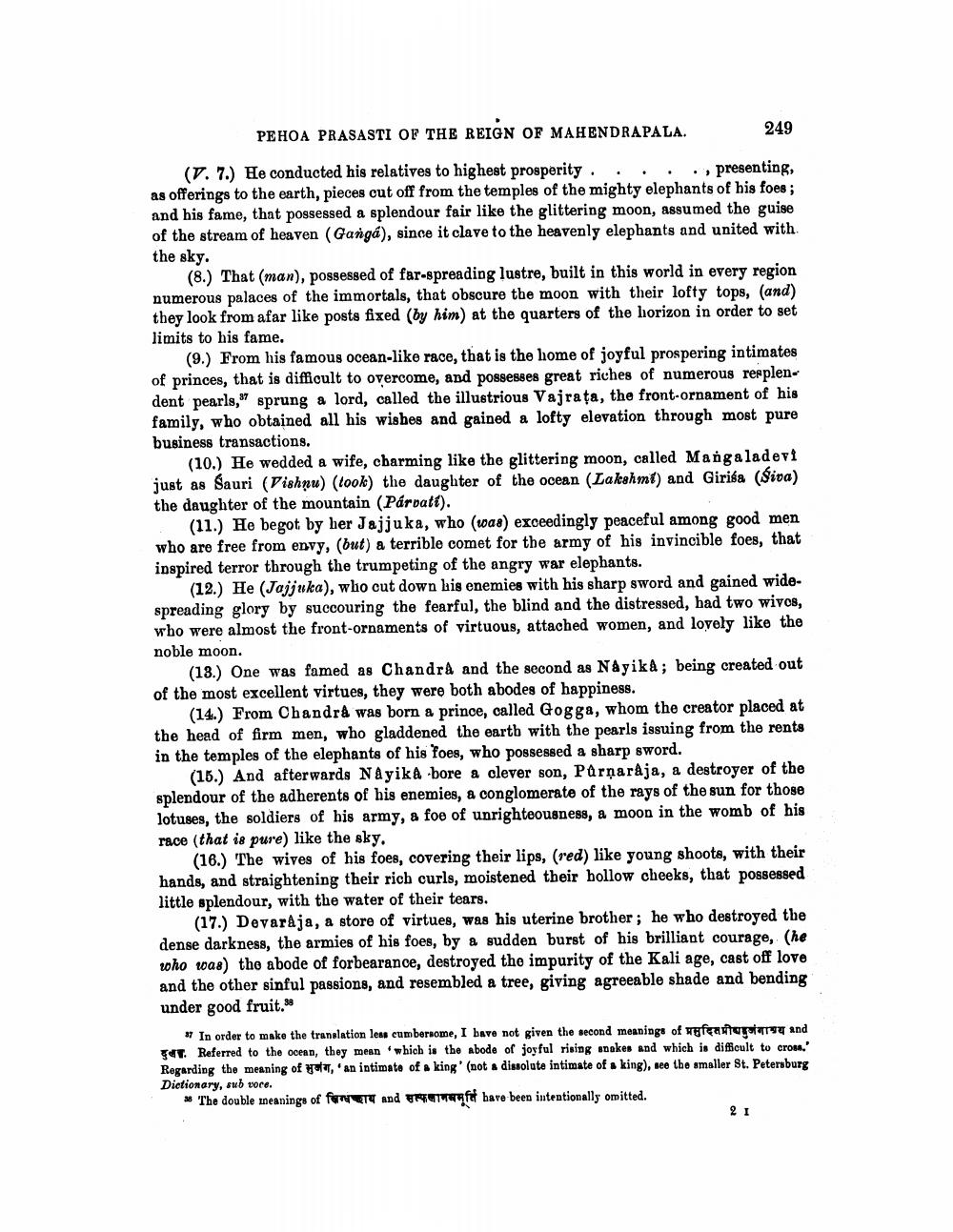________________
PEHOA PRASASTI OF THE REIGN OF MAHENDRAPALA.
249
(V. 7.) He conducted his relatives to highest prosperity.
, presenting,
as offerings to the earth, pieces cut off from the temples of the mighty elephants of his foes; and his fame, that possessed a splendour fair like the glittering moon, assumed the guise of the stream of heaven (Gangá), since it clave to the heavenly elephants and united with the sky.
(8.) That (mas), possessed of far-spreading lustre, built in this world in every region numerous palaces of the immortals, that obscure the moon with their lofty tops, (and) they look from afar like posts fixed (by him) at the quarters of the horizon in order to set limits to his fame.
(9.) From his famous ocean-like race, that is the home of joyful prospering intimates of princes, that is difficult to overcome, and possesses great riches of numerous resplendent pearls," sprung a lord, called the illustrious Vajrata, the front-ornament of his family, who obtained all his wishes and gained a lofty elevation through most pure business transactions.
(10.) He wedded a wife, charming like the glittering moon, called Mangaladevi just as Sauri (Vishnu) (took) the daughter of the ocean (Lakshmt) and Girisa (Siva) the daughter of the mountain (Párvatí).
(11.) He begot by ber Jajjuka, who (was) exceedingly peaceful among good men who are free from envy, (but) a terrible comet for the army of his invincible foes, that inspired terror through the trumpeting of the angry war elephants.
(12.) He (Jajjuka), who cut down his enemies with his sharp sword and gained widespreading glory by succouring the fearful, the blind and the distressed, had two wives, who were almost the front-ornaments of virtuous, attached women, and lovely like the noble moon.
(13.) One was famed as Chandra and the second as Nayika; being created out of the most excellent virtues, they were both abodes of happiness.
(14.) From Chandra was born a prince, called Gogga, whom the creator placed at the head of firm men, who gladdened the earth with the pearls issuing from the rents in the temples of the elephants of his foes, who possessed a sharp sword.
(15.) And afterwards Nayika bore a clever son, Púrparâja, a destroyer of the splendour of the adherents of his enemies, a conglomerate of the rays of the sun for those lotuses, the soldiers of his army, a foe of unrighteousness, a moon in the womb of his race (that is pure) like the sky.
(16.) The wives of his foes, covering their lips, (red) like young shoots, with their hands, and straightening their rich curls, moistened their hollow cheeks, that possessed little splendour, with the water of their tears.
(17.) Devaraja, a store of virtues, was his uterine brother; he who destroyed the dense darkness, the armies of his foes, by a sudden burst of his brilliant courage, (he who was) the abode of forbearance, destroyed the impurity of the Kali age, cast off love and the other sinful passions, and resembled a tree, giving agreeable shade and bending under good fruit.38
37 In order to make the translation less cumbersome, I have not given the second meanings of wgfeaturstars and F. Referred to the ocean, they mean which is the abode of joyful rising snakes and which is difficult to cross." Regarding the meaning of HT, an intimate of a king' (not a dissolute intimate of a king), see the smaller St. Petersburg Dictionary, sub voce.
38 'The double meanings of सिन्धच्छाय and सम्फलानवमूर्ति have been intentionally omitted.
2 1




